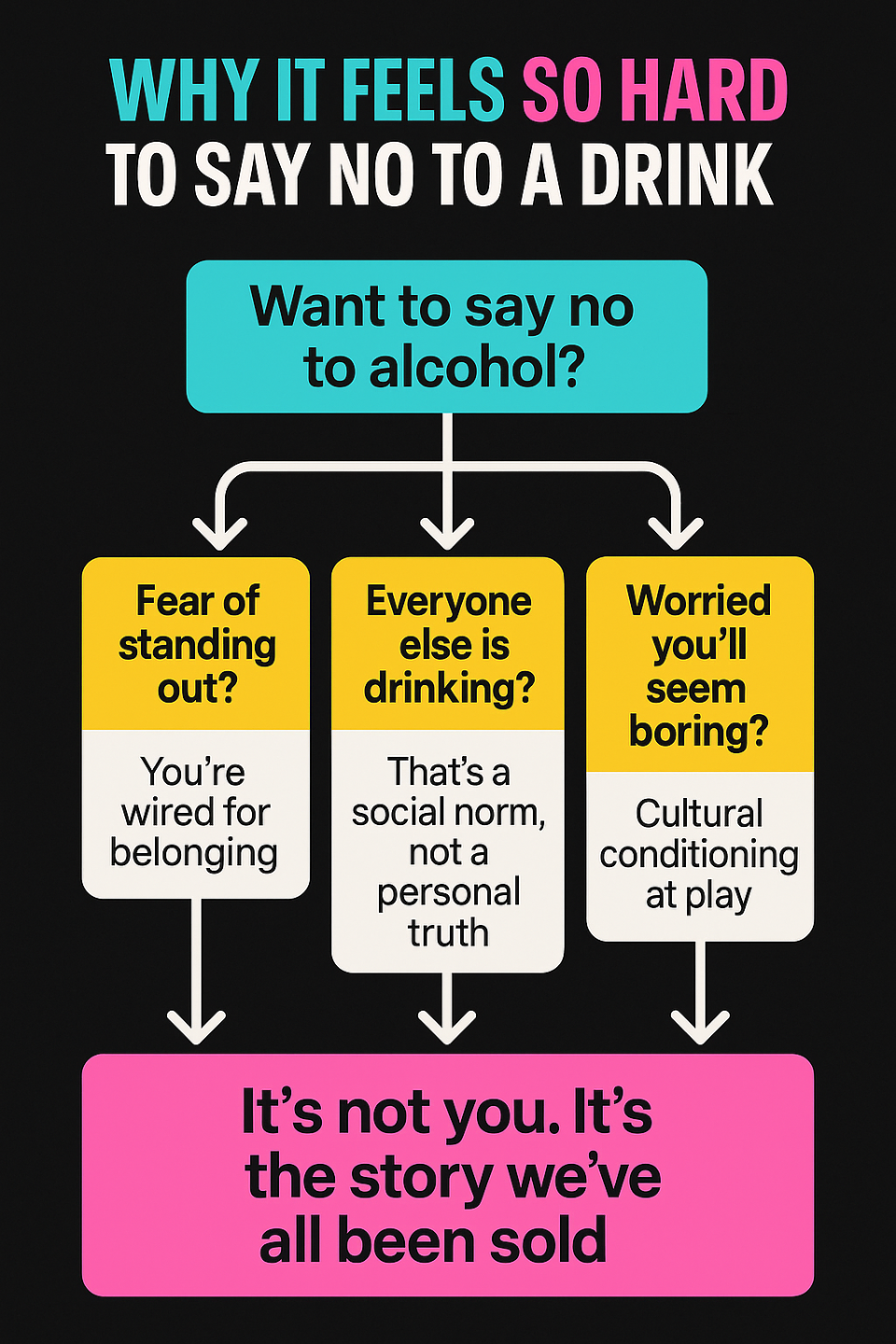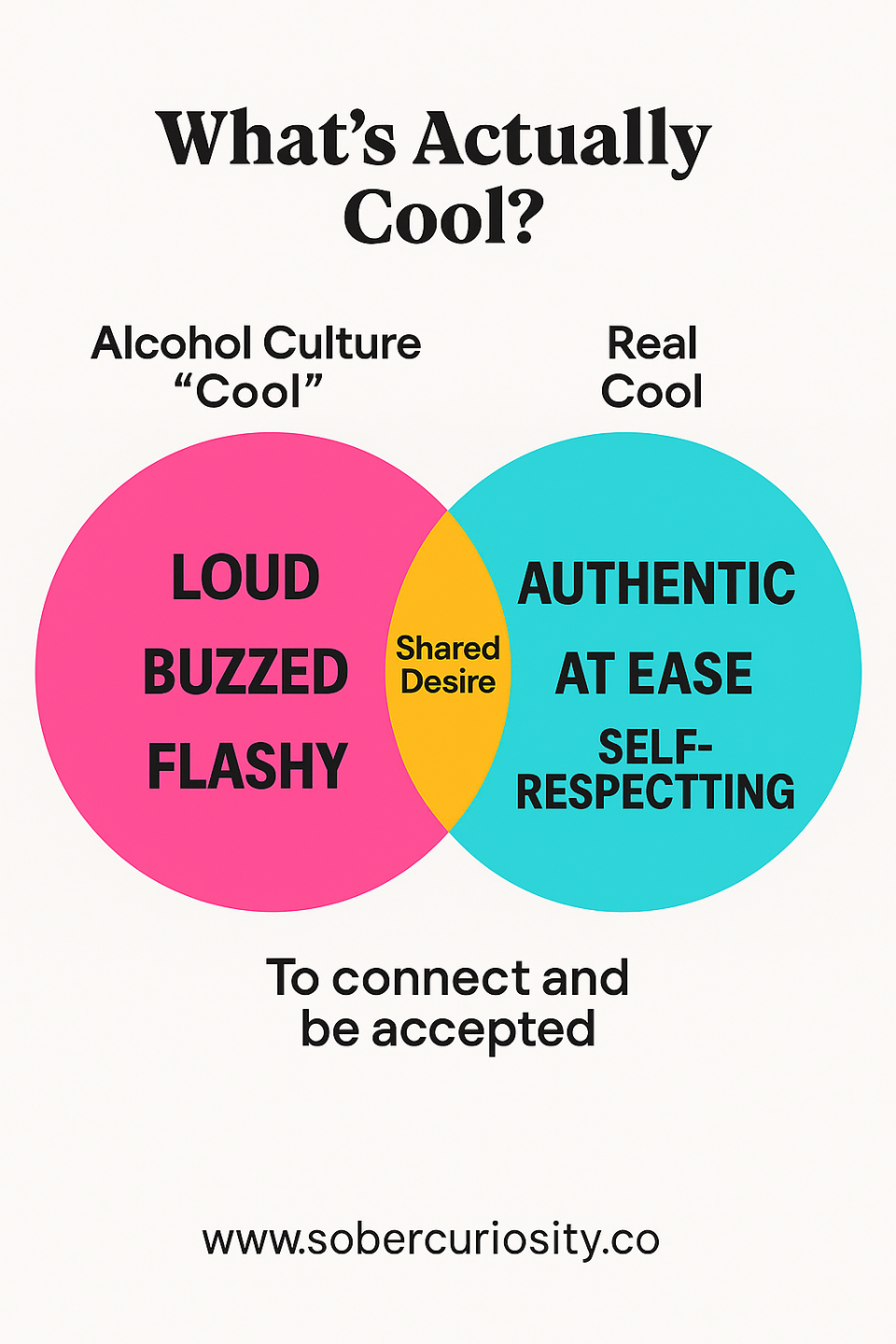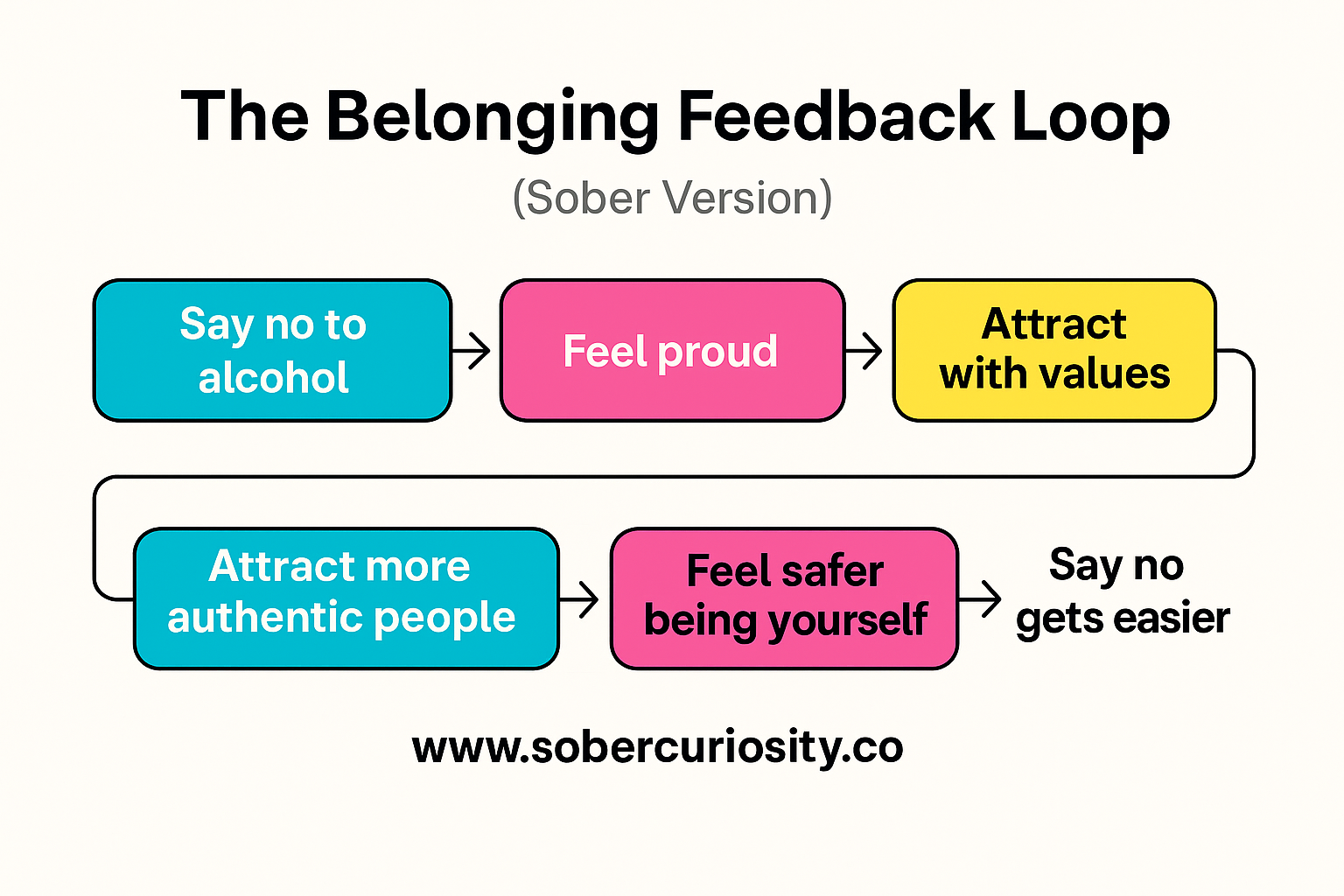I still remember the first time I went alcohol-free at a gathering.
Everyone seemed to be having a great time while I was standing there with a Sprite in my hand. Somehow, I feel like I’ve become both invisible and too visible at the same time.
It felt like everyone else belonged there, and I was tagging along, and somehow, that Sprite in my hand felt like a neon sign flashing: ‘I’m boring.’”
That moment holding a Sprite tapped into something much deeper: our primal need to belong. For most of us, saying no to a drink feels like saying no to approval, acceptance and belonging.
“If I don’t drink, I’ll be the odd one out.” “Everyone drinks, so it must be good for us”, or “Everyone will think I am lame,” is the fear I hear all the time from clients who are going alcohol-free, whether for a few weeks or for good.
Blog Overview:
- 🤝 Why saying no to alcohol feels so uncomfortable in social settings
- 🧠 How our need to fit in makes turning down a drink feel risky
- 👀 The role of social norms, peer pressure, and group behavior
- 📺 How media and marketing shaped what we believe about alcohol
- 🎭 Why drinking to “belong” often leads to surface-level connection
- 🧘♀️ How to stay true to yourself when drinking is the norm
- 💪 What being alcohol-free actually says about your confidence
- 🌊 How your choice not to drink helps shift the culture for everyone
Let’s break it all down—and explore how to stop drinking without feeling like the odd one out.
Why is it so hard to turn down alcohol in social situations?
Quick Answer: How social pressure, norms, and media make it harder to say no to alcohol
- We’re wired to want belonging — and drinking often feels like the price of admission
- Social pressure and group behavior make it hard to go against the norm
- From parties to weddings, alcohol is everywhere — it feels “normal”
- Media and marketing have taught us that drinking is cool and fun
- Saying no can trigger fears of rejection or judgment

How the need to belong makes it hard to say no to alcohol
We drink to feel belonged. The desire to fit in is deeply human, and the lengths people will go to not stand out might surprise you.
In a well-known study called the Asch conformity experiment, a group of participants were shown a few simple line drawings and asked which ones matched. An easy task, and most people got it right. Until… the rest of the group (who were actually actors) started giving the wrong answer on purpose.
Then something unexpected happened: most of the real participants started giving the wrong answer too. Just to go along.
Turns out, 75% of people conformed at least once — even when they knew the answer was wrong.
Between being right and fitting in, most people chose fitting in. So it’s no surprise how uncomfortable it can feel to order a Sprite in a room full of people holding liquor.
We’re wired to want to fit in. After all, back in the day, the ability to fit in and get along with other members was a matter of life or death for our caveman ancestors. Being exiled from a group means no food, no fire, and no shelter. You were on your own and may become a hungry tiger’s next meal any minute.
These days, standing out won’t get you eaten by a tiger, but the fear of “social death” is still very real. Many of us remember the feeling of being a teenager, walking into a room and instantly scanning for cues—who’s safe, what’s normal, how do I not stick out?
From very early on, we learned that fitting in means safety — and standing out means risk.
So how does this deep need to belonging actually play out in everyday life? One of the biggest forces is social norms -- the invisible scripts we follow without realizing.
How group behavior makes it harder to stay alcohol-free
We’re social creatures. Our brains are wired to scan for what’s acceptable in the group, and then follow that behavior. It's part of how we survived for centuries.
We even have something called mirror neurons. When we see someone smile, we’re more likely to smile back. When we watch others order a drink, we feel the pull to order one too. Let’s be real, drinking is a social norm.
“Everyone else is drinking… so it must be good for us.” is a hard feeling to shake in a culture where alcohol is everywhere. Alcohol shows up at everything—birthday parties, weddings, even baby showers. Every direction we turn, people seem to be drinking — friends, family, coworkers, even people we look up to.
In an environment like this, it’s easy to believe that drinking is just what people do—that we have to go along just to be considered “normal.” Even when we don’t want to drink, we may feel inclined to order a drink just to stay in sync with the group.
These norms don’t just appear out of nowhere—they’re shaped by the stories we absorb from culture.
What we’ve been taught to believe about alcohol and “cool”
From ads to TV shows to childhood role models, we’ve been steeped in a shared societal narrative: that drinking equals cool and fun, and sober means dull and boring.
I have to admit that I was once guilty of adding to that story. I started drinking young—the kind of girl who snuck booze to parties and prided herself on holding her liquor. I remember once rolling my eyes at a friend who turned down a beer and muttered, “You’re such a buzzkill.”
(If you ever stumble on this, Jenny: I was wrong. You were the cool one for saying no.)
I’m not proud of that moment, but I also know I wasn’t alone. So the question is: where does a 15-year-old even get the idea that “cool people drink”?
From a young age, we watch adults celebrate, unwind, and connect—with a drink in hand. Our brains quickly absorb the message: alcohol equals grown-up fun.
And it’s not just at home. We see it in TV shows and movies: Carrie and her friends sipping Cosmopolitans in Sex and the City. James Bond with his iconic martini. The brooding hero drinking whiskey.
Little did we know that behind the scenes is the alcohol industry pours billions of dollars into marketing each year, making sure we get the message—loud and clear:
Attractive people drink. Successful people drink. Cool people drink.
What makes this tricky is that these messages are mostly subliminal. They slip under the radar—right past our critical thinking—and lodge quietly in our subconscious. Most of us never stop to ask: Does drinking actually make someone cool? And if so… in what way?
🔑 Quick Takeaway: Why Saying No to Alcohol Feels So Hard
We’re wired to want to belong—and in a culture where drinking is seen as “normal,” turning it down can feel risky.
Group pressure, invisible social norms, and media messaging all reinforce the idea that drinking = fun, cool, and connection.
But when you say no, you’re not just going against the grain—you’re helping create a new one.
The 30 Reasons Why People Drink Checklist
Go from “What’s wrong with me?!” to “Oh, there’s NOTHING wrong!”
By signing up, you'll be added to Jeanette's (that's me!) newsletter list. Rest assured, you can unsubscribe at any time.
How to feel less like the odd one out when you’re not drinking
When all those messages have been playing in the background for years, it’s no wonder we feel awkward—or even ashamed—when we decline a drink. But here’s the good news: stories can be rewritten.
To truly shift our relationship with alcohol, we need to first shift the stories we tell ourselves about drinking.
Quick Tips: How to feel less like the odd one out when you’re not drinking
- Remember: real belonging doesn’t require alcohol
- Challenge the norm: just because drinking is common doesn’t mean it’s aligned with your values
- Redefine confidence: it’s about being grounded and real, not blending in
- Trust your instincts: staying true to yourself builds more self-respect over time
- Be the shift: every time you say no, you’re helping change the culture

How drinking to fit in keeps us from feeling real belonging
First, let’s talk about the need for belonging. A sense of belonging is essential for our wellbeing, whether it is in ancient times or modern day. But there’s an important difference between fitting in and belonging:
- Belonging means being fully yourself and still being welcomed.
Fitting in asks you to change yourself to be accepted.
In modern life, our physical survival no longer depends on a small group of people. What matters more now — especially for our emotional well-being — is a deep sense of belonging, not just surface-level going along and getting along.
In Brené Brown’s research, participants consistently described fitting in as exhausting and disempowering, while belonging led to greater self-worth, resilience, and emotional safety.
Sure, having a glass of wine might help you fit in with the larger crowd. It can act as a social lubricant, a mask, a shortcut to quick but often superficial connection.
But here’s the tough truth (that also holds a lot of freedom):
If you have to drink to be accepted by a group… it’s not your group.
The moment you stop using alcohol to fit in, you will often find yourself opening the door to something better — real belonging. The kind where your offbeat interests, your charming quirks, and your truest self finally get to shine through and be celebrated.
That’s what truly means to belong: when we no longer have to shape-shift and can just start to be. And that brings us to the next question: what if the “normal” thing everyone’s doing… is actually not good for us.
Quick Takeaway:
- Fitting in means changing yourself; belonging means being yourself
- Drinking to fit in creates surface connection, not real closeness
- If you need alcohol to be accepted, it’s not true belonging
How to stay true to yourself when drinking is the norm
Now let’s talk about the difference between social norms and inner alignment.
But here’s the thing: being on the side of the majority doesn’t always mean it's actually right, good, or aligned for you. As Mark Twain said, “Whenever you find yourself on the side of the majority, it’s time to pause and reflect.”
Think of Rosa Parks. At the time, going along with segregation was the norm. But one person’s refusal to follow the crowd sparked a movement that changed history.
Or think about cigarettes. For decades, smoking was everywhere — in offices, airplanes, even doctors’ lounges. But the norm eventually shifted with decades of research, advocacy, and awareness. Today, not smoking has become the norm.
What we call “normal” is always evolving. And sometimes, choosing what’s best for you means stepping outside the norm first.
Yes, drinking regularly may be the norm right now, but “normal” isn’t a fixed standard. What everyone does is often a changing cultural practice.
A few decades ago, smoking was the thing. Cars came with built-in lighters. People lit up on airplanes. I remember my first international flight at age five—sitting in the smoking cabin beside my mom, who was holding my newborn sister, while adults around us filled the air with smoke.
But today? Only a small percentage of people smoke, and when they do, they have to leave the building and stand in a designated area. That’s how much norms can shift.
The point is: “norm” shifts, and just because something is normal doesn’t mean it’s good for us.
Quick Takeaway:
-
What’s “normal” isn’t always what’s right for you
-
Social norms change — just like they did with smoking
-
Real alignment means choosing what supports your well-being, not just what others do

What being alcohol-free says about your confidence
We’ve talked about norms, narratives, and fitting in. But let’s zoom out. What are we actually chasing when we reach for that drink? For many, the answer is simple: we want to feel cool. But what does that even mean?
For me, I’ve noticed that my definition of “cool” has changed as I’ve grown older. I used to think it meant being popular, getting attention, or going along with the crowd. But now? It looks different.
Today, when I think of someone who’s cool, I think of someone who is:
-
Confident — They don’t need to prove anything
They are often not the loudest ones in the room. They are not bragging or trying to dominate a conversation. Their confidence seems to be quieter but steady—you can feel it. They know who they are and don’t need everyone else to agree.
-
At ease — They are comfortable in their skin
They are also not always the most agreeable ones. They’re not scrambling to fit in or be agreeable. Whether they’re dressed up or laid back, talkative or quiet, they just show up as themselves. And that puts other people at ease, too.
-
Authentic — They’re honest, even if it’s a little different
They don’t fake interests or pretend to go along. They speak their mind—kindly and clearly. They laugh when something’s funny and stay quiet when it’s not. They’re not afraid to say, “No thanks, not for me,” without making it a big deal. They’re true to themselves—even if that means standing out a little.
When we break down the traits that truly make someone cool—confidence, ease, authenticity—it’s worth asking: does alcohol really help us become that person? Or does it just feel like it does for a little while?
-
Alcohol and Confidence
We may feel bolder after a drink or two. But that confidence is borrowed. It doesn’t come from within—it comes from muted self-consciousness. And when the buzz wears off, we often feel more anxious, more unsure, or a little regretful.Real confidence isn’t about numbing doubt. It’s about building self-trust.
-
Alcohol and Ease
Sure, alcohol might make socializing feel easier, but it also makes it harder to truly be at ease with ourselves. That little voice that says, “I need this drink to relax, to loosen up, to get through this,” often leaves us feeling that we need something outside of us just ot be okay. -
Alcohol and Realness
At first, alcohol might help us open up. But the most uninhibited version of ourselves isn’t always the most authentic. We might laugh more, talk more, feel more connected—but how much of it is truly us? And how much is just our brain in an altered state? Sometimes, alcohol becomes the mask we wear to feel normal—when what we really want is to be ourselves.
Quick Takeaway:
- We often drink to feel confident, relaxed, or socially accepted — but those feelings are borrowed
- True confidence comes from knowing who you are, not from what's in your glass
- Alcohol might loosen us up, but it can also disconnect us from our real, grounded self
- Being alcohol-free can reflect self-trust, ease, and authenticity — the very traits that make someone truly “cool”

How drinking culture is shifting — and why more people are going alcohol-free
At Sober Curiosity, we believe that truly outgrowing alcohol—and building a thriving alcohol-free life—takes more than just “stop drinking.”
It takes rewriting the stories you’ve been told about alcohol and yourself. It include the stories:
- “I need a drink to fit in.”
- “Everyone drinks, so it must be good for me.”
- Or “Drinking is cool and sober is lame.”
Today, we are facing a shift around alcohol that mirrors the cultural pivot we once saw with cigarettes.
Smoking was everywhere — glamorized in ads, normalized in media, and widely accepted in social settings. But then, health research, advocacy, and public awareness slowly pulled back the curtain on the risks. Now, smoking is heavily restricted, often stigmatized, and widely seen as a personal and public health concern.
In recent decades, alcohol has followed a similar path — glamorized on social media, celebrated in pop culture, and deeply woven into our social lives. But that story, too, is starting to shift. Research now links alcohol to cancer, depression, anxiety, and disrupted sleep. And people are beginning to pay attention.
More and more — especially among millennials and Gen Z — folks are taking breaks from drinking, not because they “hit bottom,” but because they’re questioning whether alcohol really serves them. Non-alcoholic beer, wine, and spirits are now among the fastest-growing beverage categories. Celebrities and public figures are sharing their alcohol-free journeys. And the cultural conversation is changing.
Just like we once glamorized cigarettes, we’ve spent decades normalizing alcohol as a harmless social staple. But that story is beginning to unravel.
A new wave is forming — one where more people are asking, “Is this really what I want?” And where sober curiosity and alcohol-free living are seen as empowered choices — not punishment or failure.
We are entering an age of collective unlearning and awakening around alcohol. And you're part of the wave.
Join The Sober Curiosity Insider
Get bite-sized sober curious insights straight to your inbox. Making taking a break from alcohol easier than ever.
By signing up, you'll be added to Jeanette's (that's me!) newsletter list. Rest assured, you can unsubscribe at any time.
TL;DR: Why Saying No to a Drink Feels So Hard — And How to feel less like the odd one out when you’re not drinking
- Saying no to alcohol in social settings can feel deeply uncomfortable — not because you lack willpower, but because of our primal wiring for belonging
- From early on, we learn that fitting in = safety, and alcohol often feels like the price of admission
- Social norms, media, and marketing have conditioned us to associate drinking with fun, coolness, and connection
- But here's the twist: real belonging doesn’t require alcohol — and neither does real confidence
- Going alcohol-free is not about missing out — it’s about choosing alignment over approval
- Each time you say “no thanks,” you help rewrite the story — for yourself, and for the culture
- The sober curious movement is growing fast — you’re not alone, and you’re not weird. You’re just early to something new

🚀 Ready to Redesign Your Drinking Habit? Start With These Four Pillars
Sober curious or newly alcohol-free? You’re in the right place.
Breaking free from alcohol’s grip—and building a life you’re genuinely excited to show up for—takes more than white-knuckling your way through it.
It takes the right strategy, and the right focus at the right stage.
The good news? You don’t have to figure it out alone.
Inside Sober Curiosity Society, our signature membership, you’ll be guided through The Sobriety Hero’s Roadmap™ using the Four Pillar Sobriety System™—so you can go from feeling deprived and missing the buzz…
to feeling free, confident, energized, and genuinely good about saying no to a drink.






You’re Too Smart to Still Be White-Knuckling It.
Take this quick 7-question AF Breakthrough Quiz below to find out exactly where you are in your alcohol-free (AF) journey—and what to focus on next to stop spinning your wheels and finally break the cycle for good.

